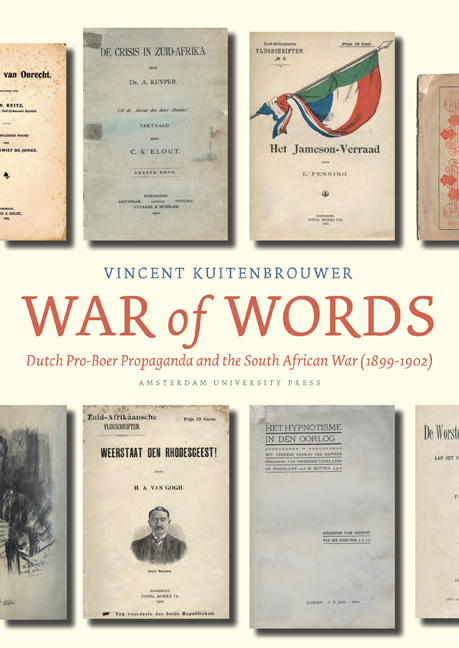Chapter 2 - ‘Blacks, Boers and British’: South Africa in Dutch literature
Published online by Cambridge University Press: 15 January 2021
Summary
The (re-)discovery of the Boers by the Dutch public at the end of the nineteenth century was accompanied by a great increase in the number of publications about South Africa that appeared in the Netherlands. Many authors from that time were well aware that they stood in a long literary tradition dating back to the journal that Jan van Riebeeck kept after landing at the Cape of Good Hope in 1652. But this had been quite different during the greatest part of the century. After the handover of the Cape Colony to the British in 1806, the production of books about South Africa dwindled, and in general those that were published were quite negative about the Boers. The interest in the Boer republics after the Transvaal War brought about a radical change: not only did the number of publications about South Africa grow but the tone about the ‘cousins’ in that part of the world became far more positive. Dutch Africana included many genres such as travelogues, memoirs, ethnographic studies, novels, children's books, poetry, history and journalism. In addition, the authors had many different backgrounds, which affected their views on the situation. People who had lived in South Africa were often influenced by their personal experiences and their political allegiances. But not all authors were familiar with the local situation. There were even writers who had never set foot in the region and took their information from what they read about the country and its inhabitants.
Literary scholars, both in the Netherlands and South Africa, have written interesting studies about Dutch Africana. These books have been used as guides for this chapter, which does not aim to give a complete overview of this corpus but rather provide an outline of some of the themes that it featured. Before the Second World War, academics such as G. Besselaar and Elizabeth Conradie pioneered the field, describing the literature up until the early twentieth century. Both of them were of Afrikaner descent and their work should be considered in the light of the development of Afrikaans as a separate language, which they saw as a desirable and logical development.
- Type
- Chapter
- Information
- War of WordsDutch Pro-Boer Propaganda and the South African War (1899–1902), pp. 65 - 102Publisher: Amsterdam University PressPrint publication year: 2012



